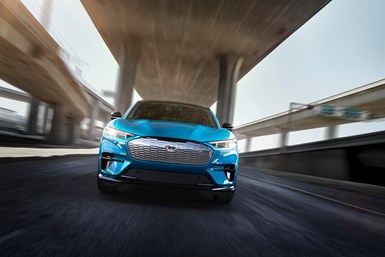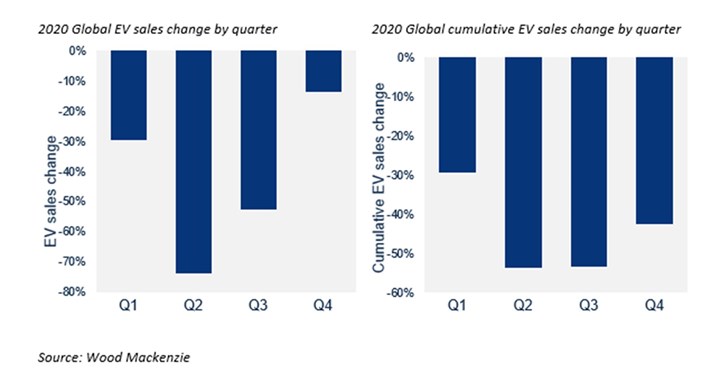EVs and COVID-19: Low Energy Sales
2020 will not be a good year for global EV sales, research firm predicts
#hybrid
Although vehicle sales of all types are going to be hit hard due to the COVID-19 global pandemic, according to research from Wood Mackenzie, electric vehicles (EVs) are not only going to have reduced overall sales, but the pace of production launches of new EVs are going to be likely delayed by the change in the market.

Mustang Mach-E. Announced early. Being launched later. (Image: Ford)
According to the firm, 2019 global EV sales were 2.2 million units. It anticipates that number will fall by 43%, to 1.3 million units by the end of 2020.
Even before the pandemic caused the collapse of vehicle sales of all types, OEMs were doing something unconventional regarding EVs. They announced vehicles that would be coming out well after the time of the announcement.
As Ram Chandrasekaran, Wood Mackenzie principal analyst, put it: “Ford introduced its Mustang Mach E in November 2019 but it won’t be widely available until H1 2021. Volkswagen has been promoting the ID.3 for several years but isn’t expected to starting selling the model until later this year. General Motors celebrated an ‘EV Day’ on March 4th to tout its readiness for the transition to electric vehicles, however, none of its new products are going to be available until late 2021.”

Wood Mackenzie research anticipates a tough go for EV sales this year. (Image: Wood Mackenzie)
What’s more, Chandrasekaran said, “The automakers’ response to the pandemic—suspending car manufacturing to focus on making medical equipment—is only going to delay model launches further.”
Then there is an additional factor: The question of what consumers will do in the next several months.
“From a consumer’s perspective,” Chandrasekaran said, “it makes perfect sense to wait longer for these models. After all, a car purchase is a large financial investment that lasts several years. Unfortunately, for EV adoption, this is likely to lead to a plateauing of sales in the near term. While the pent-up demand from the pandemic will help a bounce back in sales later in the year, new demand growth will lack until 2021.”
But Chandrasekaran said that he thinks that the global OEMs will stick with their EV efforts: “Despite the potential delays in EV adoption, several automakers have expressed a desire to be carbon neutral due to government policies and a change in investor attitude.
“The shift towards sustainability is the driving force behind the electrification of transport. Uncertainty caused by the oil price war and global catastrophes will only serve to strengthen that resolve, not deter it.”
RELATED CONTENT
-
The Koenigsegg Jesko Has An Amazing Engine
It is hard to believe that this is a vehicle in “serial” production with such extraordinary powertrain performance
-
When Automated Production Turning is the Low-Cost Option
For the right parts, or families of parts, an automated CNC turning cell is simply the least expensive way to produce high-quality parts. Here’s why.
-
Jeeps Modified for Moab
On Easter morning in Moab, Utah, when the population of that exceedingly-hard-to-get-to town in one of the most beautiful settings on Earth has more than doubled, some people won’t be hunting for Easter eggs, but will be trying to get a good look at one of the vehicles six that Jeep has prepared for real-life, fast-feedback from the assembled at the annual Easter Jeep Safari.


.jpg;width=70;height=70;mode=crop)






